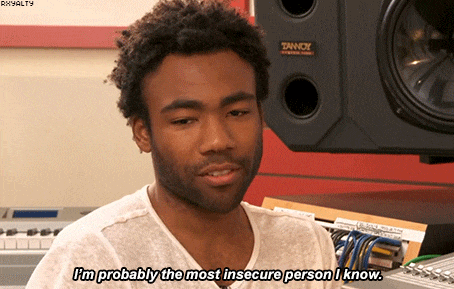)Writers-- they've great with expressing words on a page or they creating a whole world just from the thoughts in their head. They're wonderful people who can sometimes get very caught up in their thoughts. But have no fear! If you're hoping to be a friend or a significant other to someone who is a writer, there are some things you need to know (or already know, and might just appreciate reading about.)
1. Obviously, writers are people too.
Just like every other hobby or career, writing attracts all kinds of people. Some are very extroverted, others are very introverted, and many are someone else in the spectrum. All kinds of personalities go to writing-- and for different reasons. Never judge a book by its cover, and never judge a person by their writing.
2. Patience is the key.
For some, writing is a very big activity for them. It's possible they've even planned for it to be their career; a lot of time is going to be dedicated to shaping their craft. Some days it's going to take them a lot of time to get away from their stories, and others they're going to go easily. The goal is let them have their time when possible.
3. Sometimes writers will find inspiration through you-- and that's okay.
Inspiration is everywhere for a writer. Sometimes it's through objects, events, or other qualifying details, but other times it's found through people. Don't be offended by it, no matter where it goes. You are not the character or vice versa (unless they say otherwise; it is their own writing, after all). It's possible there are only a couple of parts of you that they drew inspiration from, including negative traits you may have. You may be the last missing piece to a beautiful work!
4. They are not required to write anything for you.
Just because you're their friend or significant other, they are under no obligation to write your own, personal piece. It's there's a difference between a gift and a request.
5. You are not required to write anything for them.
With that being said, they shouldn't be asking you to write them anything, either. You shouldn't need to impress them with their own hobby if you don't want to. If that's happening, then there's some kind of poisonous balance going on in this relationship. They should appreciate you for your own sets of talents and hobbies and you do the same for them.
6. They may need to spend time writing at random times.
Just like how inspiration comes from everywhere, it can hit a writer at random, sporadic times. They may need to put a note in their phone for later, or take out a notebook and write the ideas down. It's not to be rude; it's because it's very easy to forget a good idea. It's like when you study for a test one night and then are unable to recall every single fact you studied the next day. Give them a moment to write own their idea quickly so they can get back to spending time with you.
7. They may need to just spew out ideas about their current project.
Sometimes, ideas and plot points become more developed when a writer spends time talking about it with someone. If they talk to you about it-- congratulations! They're rambling to you about something that is important to them. This is your opportunity to bounce ideas back at them and help hone in their ideas.
8. They're not rejecting you if they've chosen to spend time writing over spending time with you once in a while.
Again, a lot of it is based on how sporadic inspiration comes to people. Some social scenarios may be rejecting because they're on a writing streak and have motivation and fuel to power through the rest of their ideas. Let them have those times to just sit and work-- just help them remember that they have a life outside of their work too if they're too caught up in their streak.
9. Chances are if they allow you to read a work-in-progress, they want your honest feedback and support.
If a writer is fortunate enough to find a program they can afford that also offers time to workshop their work, then they will get to hear feedback about their work from someone who has never read their piece before. Having them share it with you is a similar experience for them; it's very easy to feel nervous to share their work, even if it's with someone they love and trust. Make sure your feedback is helpful; notes such as "it's good!" or "I don't like this" needs to be backed up with specific notes. Why was it good or bad? You have the chance to help improve their craft.
10. They may have days where they are just frustrated or doubtful with their work.
Writer's Block and the inability to correctly word their ideas are common woes of a writer. If they seem stressed out about it, offer to distract it with something that both of you enjoy. It's easier for a writer to go back to their work later when they have a clean slate in their mental space.
11. Their work is not a reflection of their character-- unless they say so.
Especially for writers who write scenarios outside of their moral compasses, it doesn't mean that they believe every thing happening in their story is right or something they believe in. They write because they have a story that needs to go on paper.
12. It's okay that you might not like all of their work.
You are under no contract that likes everything that the writer creates. You have your own particular tastes, and it should not be compromised because of your relationship with the writer. Even more so, your support of the writer should not be based on lies. Supporting them and liking all of their works are different matters. Support means you want them to succeed, even if you're not entirely on board with all of their works.
13. They may need your help.
No one can do it all on their own. They may ask for your help with a story, or just ask to help them stay away for the story for a little while. They trust you enough to ask you to help them; be a good friend or significant other and lend a hand. They'll definitely do the same for you in the future (or maybe even add you in the dedications or something! That's always cool.)
14. They may get caught up in their work.
Writers are humans; their craft shouldn't be the only thing they do. Remind them of that. Make sure they eat when they've forgotten to and that being social can help them relax. Or just remind them to relax in general, away from their work so they can have a breather.
15. They love their craft.
Many writers pour their hearts into their work. It's like a precious treasure or child for them. This is a situation where pride is allowed and encouraged, considering all of the time and effort put into writing. There's a reason why they decide to keep writing, even when they're hit with a block in the middle of a plot. Remember that they love you too; there's a reason that they spend time with you.































